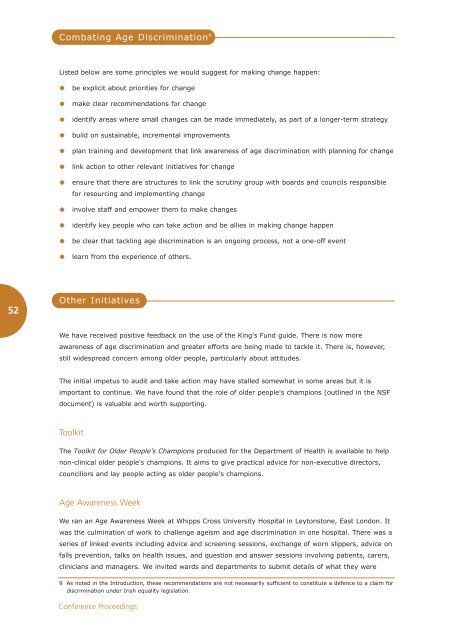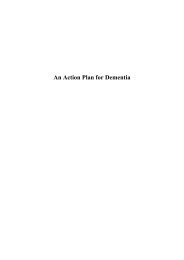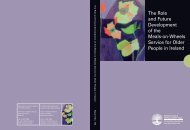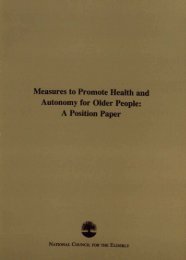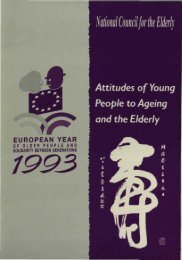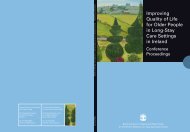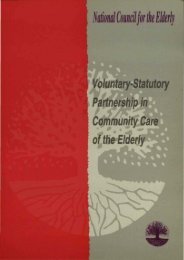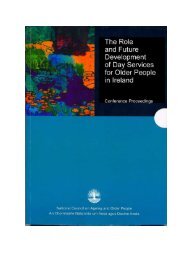From Ageism to Age Equality: Addressing the Challenges ...
From Ageism to Age Equality: Addressing the Challenges ...
From Ageism to Age Equality: Addressing the Challenges ...
You also want an ePaper? Increase the reach of your titles
YUMPU automatically turns print PDFs into web optimized ePapers that Google loves.
Combating <strong>Age</strong> Discrimination 9Listed below are some principles we would suggest for making change happen:be explicit about priorities for changemake clear recommendations for changeidentify areas where small changes can be made immediately, as part of a longer-term strategybuild on sustainable, incremental improvementsplan training and development that link awareness of age discrimination with planning for changelink action <strong>to</strong> o<strong>the</strong>r relevant initiatives for changeensure that <strong>the</strong>re are structures <strong>to</strong> link <strong>the</strong> scrutiny group with boards and councils responsiblefor resourcing and implementing changeinvolve staff and empower <strong>the</strong>m <strong>to</strong> make changesidentify key people who can take action and be allies in making change happenbe clear that tackling age discrimination is an ongoing process, not a one-off eventlearn from <strong>the</strong> experience of o<strong>the</strong>rs.52O<strong>the</strong>r InitiativesWe have received positive feedback on <strong>the</strong> use of <strong>the</strong> King's Fund guide. There is now moreawareness of age discrimination and greater efforts are being made <strong>to</strong> tackle it. There is, however,still widespread concern among older people, particularly about attitudes.The initial impetus <strong>to</strong> audit and take action may have stalled somewhat in some areas but it isimportant <strong>to</strong> continue. We have found that <strong>the</strong> role of older people's champions (outlined in <strong>the</strong> NSFdocument) is valuable and worth supporting.ToolkitThe Toolkit for Older People’s Champions produced for <strong>the</strong> Department of Health is available <strong>to</strong> helpnon-clinical older people's champions. It aims <strong>to</strong> give practical advice for non-executive direc<strong>to</strong>rs,councillors and lay people acting as older people's champions.<strong>Age</strong> Awareness WeekWe ran an <strong>Age</strong> Awareness Week at Whipps Cross University Hospital in Ley<strong>to</strong>ns<strong>to</strong>ne, East London. Itwas <strong>the</strong> culmination of work <strong>to</strong> challenge ageism and age discrimination in one hospital. There was aseries of linked events including advice and screening sessions, exchange of worn slippers, advice onfalls prevention, talks on health issues, and question and answer sessions involving patients, carers,clinicians and managers. We invited wards and departments <strong>to</strong> submit details of what <strong>the</strong>y were9 As noted in <strong>the</strong> Introduction, <strong>the</strong>se recommendations are not necessarily sufficient <strong>to</strong> constitute a defence <strong>to</strong> a claim fordiscrimination under Irish equality legislation.Conference Proceedings


